Business Scientist. Since 2018, he has been Professor and Researcher at Fundação Getulio Vargas (FGV IDE - Institute for Educational Development), and at Escola Superior de Propaganda e Marketing (ESPM/SP). At FGV IDE, he teaches in the Executive MBA courses in Strategic and Economic Business Management, and in the Executive MBA course in Business Analytics and Big Data, where he has supervised the preparation of +100 end-of-course working paper (applied analytical projects) carried out in groups of students, using a methodology created for structuring and executing projects, with academic rigor and applied relevance.
Prof. Favaretto holds a Master's (2015) and Doctor's degree (2019), approved with distinction, in Business Administration (Management Information Systems) by FGV EAESP (Getulio Vargas Foundation - School of Business Administration of São Paulo). He also held a Postdoctoral internship (2021) in Business Administration (Diffusion of Innovations) at ESPM/SP - two Brazilian business schools that are effective members of the AACSB (Association to Advance Collegiate School of Business).

Prof. Dr. José Favaretto - Professor and Researcher (FGV and ESPM)

Research interest
The current research interests (academic and applied) of Prof. Dr. José Favaretto are grouped into two study fronts:
• 1.) Data & Analytics, Artificial Intelligence, Business Technology & Innovation | Data Science & Analytics for organizational decision making (exploration, modeling, data visualization, data literacy, data storytelling), Business Analytics, Business Value, Data Analytics, Data Science, Decision Analytics, Data-Driven Decision Making, Artificial Intelligence (machine learning, and generative AI models), Digital Business, Business Model Innovation, Diffusion of Innovations and Technologies, Technology and Innovation Management (TIM), Disruptive Innovation, Innovation Diffusion;
• 2.) Education and Popularization of Science & Technology (S&T) | Scientific methodology; Productivity, Rigor, Relevance and Impact in Scientific Research; Critical Reflection and Scientific Thought; Internationalization of Scientific Research; Systematic Literature Reviews & Bibliometric Studies; Analysis and Assessment of Scientific Production Indicators.
As a scientific researcher in the field of Technology and Innovation Management (TIM), belonging to Management knowledge Area [of the major Area of Applied Social Sciences], Prof. Dr. José Favaretto has interest in the research themes (academic and applied) addressed to 1.) Data & Analytics, Artificial Intelligence, Business Technology & Innovation, and 2.) Education and Popularization of Science & Technology (S&T).
Data Science & Analytics, Digital Business, Business Model Innovation, Business Value, Decision Analytics, Data-Driven Decision Making, Artificial Intelligence, Technology and Innovation Management (TIM), Disruptive Innovation, Innovation Diffusion
Scientific research based on the Innovation Diffusion Theory (IDT), coming from the Sociology knowledge area (Rogers, 2003), with the use of mathematical / quantitative modeling (Bass, 1969; Gompertz, 1825; Verhulst, 1838), for the observation and assessment of the adjustment of the S-curve or sigmoid (technological adoption / diffusion curve), and their comparison, analysis and future performance prediction (forecast) among models discussed in the academic literature (Bass, Gompertz, Logistic e outros). Time series are used to analyze the diffusion of technological products in the world Telecommunications sector, as well as new global technologies based on Artificial Intelligence (AI), Blockchain, Data Analytics, and Internet of Things (IoT).
Analyze the global connection networks formed by the theme of Artificial Intelligence (AI), with regard to: the group of researchers who study and discuss this theme; the identification of the different higher education institutions in the world where these researchers are linked; the main applications of AI discussed in articles obtained in international journals with a high impact factor, in the field of Technology and Information Management (TIM). Investigate the diffusion of AI in different countries around the world, as well as identify the AI applications already developed and those that are under development, both in academia and professionally.
Construction of quantitative models using differential equations, multivariate statistical techniques (multiple regression, binary logistic regression, factor analysis, cluster analysis, PCA, etc.), modeling with structural equations (PLS-SEM) and panel data analysis. Data scraping (selection of primary / secondary data sources, collection, filtering and integration), exploratory analysis, graphical / visual analysis, Social Network Analysis and Text Mining techniques, interpretation of results and strategic use of Data Analytics for organizational decision making.
Academic research based on the Stages of Growth Theory and the study field of Management Information Systems (MIS), from the seminal article of Richard Nolan (Nolan, 1973). It seeks to identify the Stage Level of Information and Communication Technology/Information Systems (ICT/IS) initiatives in contemporary Organizations (Favaretto, 2019; Favaretto, 2015; Favaretto & Meirelles, 2015). It allows the issuing of an informative Report and Diagnostic in real time, containing 6 pages (A4 format) for the respondents. Participation in this survey is restricted to guests only.
Scientific methodology; Productivity, Rigor, Relevance and Impact in Scientific Research; Critical Reflection and Scientific Thought; Internationalization of Scientific Research
Improve reliability, efficiency and effectiveness in the development of scientific research. Improvement of key elements of the scientific procedure: method, reproducibility, organization of bibliographic references, correct use of scientific databases, generation of reports. Structuring of qualified research, with ethics, rigor (theoretical and methodological robustness), academic relevance (research generated with real contribution to the field / study community, seeking a high number of citations) and applied relevance (generate some direct benefit for people, organizations or governments, reflecting on impact for society).
Study of the dimensions of internationalization of research (Diniz, Favaretto, Oliveira, Brólio, 2017a, 2017b; Diniz, Oliveira, Favaretto, e Brólio, 2018a, 2018b, 2019) and internationalization indicators that guide the characteristics of the profile of researchers and research with high academic / scientific impact. The teaching-research dichotomy observed by institutional variables [of Higher Education Institutions (HEI)] and by individuals (teachers / researchers). The worldwide comparison of personal characteristics and the incentives promoted and / or financial investments offered by HEIs, by agencies that promote scientific research (in Brazil: CAPES, CNPq, FAPESP, etc.) and by the governments of the world, in the development of actions of Education and Popularization of Science & Technology (S&T).
Systematic Literature Reviews and Bibliometric Studies using secondary databases / open data, collections of journals, scientific publications [with DOI] in academic sources recognized by the community (Web of Science, Scopus, InCites, Crossref, Spell, Scielo, etc.). Collection, data extraction, data cleaning, insertion of filters (keywords chosen by the researcher), identification of academic impact according to national and international scientific ranking / classifiers. Analysis and discussion of the results obtained, using multivariate statistical techniques, Social Network Analysis (SNA), Text Mining, among others. Systematic literature reviews executed by order (tailor-made), according to the defined criteria and choice of the database and / or research theme to be explored by the interested party.
Study of indicators for the measurement and assessment of Scientific Production / Productivity of academic groups (teachers and / or researchers; national or international), or of Post-Graduate Programs (PPGs) in Brazil. Conception and permanent development of an on-line system [in the cloud], which uses task automation to facilitate the recurring execution of this procedure by PPGs. Continuous and in-depth study of Scientific Methodology to disseminate scientific publications of high quality and impact. Main focus centered on the structure of Science paradigms according to the vision of Thomas Kuhn (Kuhn, 1970) and identification and exploration of Scientific Thought (regulated, grounded, without using adjectives).
Disciplines with content directed to Postgraduate stricto sensu courses (Academic or Professional Master / Doctorate), or Postgraduate lato sensu courses (Executive MBA, Executive Postgraduate courses, Master in Business and Management, Specialization). The meetings of the courses can be delivered in-person mode or remotely (distance learning, live), and the contents can also be adapted to the Training, Workshop or Minicourse format.
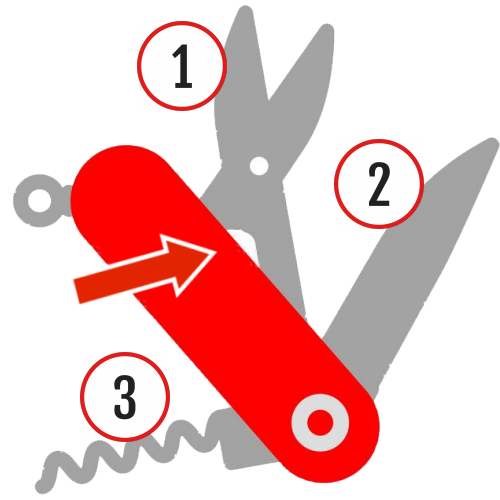
Content designed to organize the proper formatting of scientific projects , being discussed briefly in three blocks: 1.) Format of academic projects; 2.) Access and use of scientific databases; 3.) Integration with Mendeley.
To know the access to the structural document of Thesis, Dissertation, Scientific Article, etc., with the provision of a 'pre-formatted mask' (MS-Word file) in the standard required by the School or Journal / Conference. To know and access [with hands-on and examples] scientific databases (i.e: subscription to CAPES journals and others), identifying searchers, classifiers and Publishers that are recognized by the academic community. To know the management / organization of references and PDF files with Mendeley (materials of your research that is in progress), integrating it with the scientific databases and with the automated maintenance of citations and reference list, via structured document of MS-Word.

Theoretical and practical content to support processes and activities necessary for carrying out scientific research (academic or applied), with the objective of stimulating productivity in repetitive tasks, and taking advantage of the researcher's time to deepen the rigor, relevance and quality of the content ("filling") of scientific projects. To Know and use a set of tools for productivity management and good practices in scientific research, composed of software and services available in the cloud (reference managers, impact indexers / classifiers, academic searchers / scientific databases, researcher registration platforms / academic social networks, etc.), and rules for conducting research activities with ethics, rigor (theoretical, structural and methodological), in addition to the search for relevance and academic / applied impact. Also learn about scientific indicators/qualifiers (H-index, impact factor, rankings, etc.) and how to identify relevant journals in your field of study.

Expository classes bringing step-by-step to build the outline / chapters ("backbone") of scientific projects (Thesis, academic or professional Dissertation, Academic or applied Project, Scientific article, analytical Project, etc.), obligatorily making use of Scientific Thinking .
Study and practice the construction / structuring of the steps / blocks that integrate a scientific project: Identification of the Paradigm & Scientific Community. Plagiarism - rules and considerations. ABNT and APA standards for the correct use of Citations and References. Introduction - Theme, Research Question, Justifications (of the Phenomenon / scientific problem and the Context / 'piece trimmed' and context of the research), Objectives (General and Specific). Literature review (theoretical body or state-of-the-art theoretical basis / updated). Method (step-by-step performed in the research). Results, Analysis and Discussion. Limitations of Research / Future Studies. Conclusion - Contribution and Implications. Appendix / Annexes.
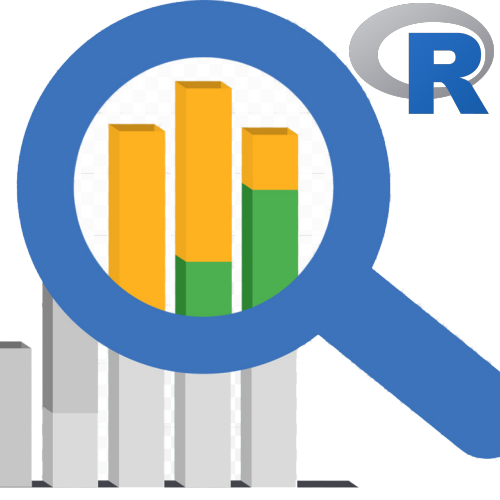
Understand the principles of Data Science and Analytics, using different approaches to subjects, concepts, techniques and data analysis, establishing relationships with their applicability in business and / or marketing. Understand the complete cycle of data analytics stages, to transform datasets from primary and / or secondary sources, into useful information and new knowledge for decision making in organizations. Teacher lectures, with Data Science & Analytics software tool hands-on bringing examples of practical applications with various analytical approaches (GeoAnalytics, ImageAnalytics, TextAnalytics, Sentiment Analysis, Clustering, Social Network Analysis, among others). Practice the investigative and interpretative perception of the results obtained in the process of data analysis. Softwares used in the analysis: R, Python, Orange and Julia.
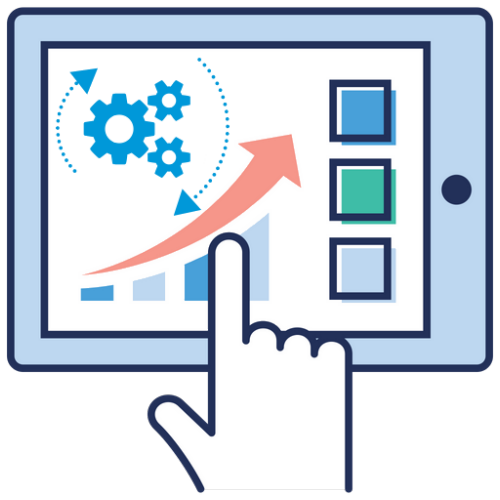
Follow a complete methodological roadmap to structure an applied Analytical Project - projects that are mandatorily guided by an analytical cycle, that is: they adopt a quantitative method, use some technique / statistical approach, and deliver some applied / practical / managerial contribution. Systematization of the four-stage cycle in the execution of the Analytical Project: Problem to be investigated; Contribution that is expected; Method and Results obtained; Analysis & Discussion / Implications. This course also seeks to understand the interrelationships between each of these four stages [in academic, applied and critical aspects], with the exploration of a real (true) dataset in the empirical / analytical stage of the study proposed in the project.

Understanding the generation of Business Value from Data Analytics is still an existing gap to be clarified in organizations. With the ubiquity of technology and data, embedded in business models, activities and organizational processes, the senior position of CDAO (Chief Data Analytics Officer) becomes increasingly present in companies. Generating value from organizational data is a task that must involve multidisciplinary teams, and no longer just centralized in technology departments. Creating good questions about business problems that have been identified, having data in adequate quantity and quality, having leadership and an organizational culture driven by data, are initial prerequisites to support the extraction of value for the business.
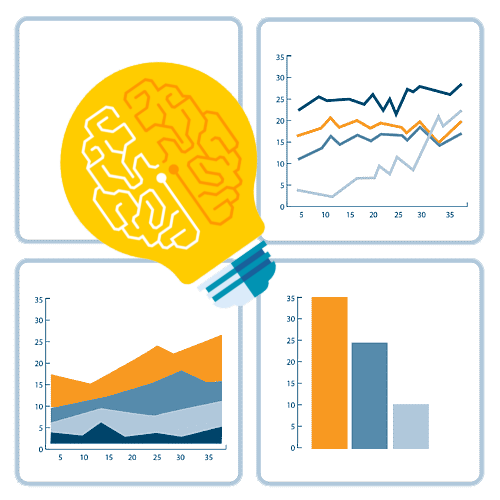
The general objective of this course is to understand the principles of Data Science and Business Intelligence, with the study of concepts, data analysis structures, construction and visualization of charts, dashboards, the use of statistical techniques, as well as their relationships with the analytical approaches applied to business. Lectures by the teacher, including hands-on software tools in all classroom meetings, to support the practical activities proposed by the discipline (individual or in groups). The course also brings applied examples of immediate use in organizational activities, extensive discussion of learned subjects, exchanges of experiences and interactions between students and teachers, in order to generate the (re)construction of knowledge collectively. Software used in classes: Orange and Tableau Desktop.
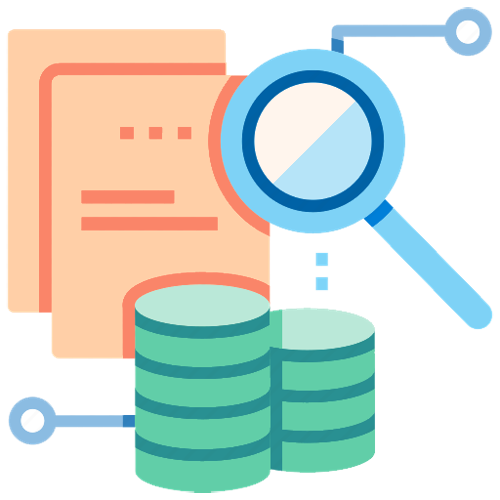
This course discusses the topics of transactional data warehousing, relational database modeling, SQL (Structured Query Language) statements, data visualization, chart construction and dashboards. Practical notions of conceptual, logical and physical data modeling and the use of ER (Entity-Relationship) model diagrams are presented. Creation of tables, their relationships and integration with relational database. Practice of basic statements with SQL commands to create structures for storing, exploring, handling and querying data. Business case analysis with applied database examples, for the control and operation of various types of businesses. Data visualization resources, covering concepts and practical examples. Creation of data dashboard for decision making and strategic business analysis. Software used in classes: MySQL server, MySQL Workbench and Tableau Desktop.
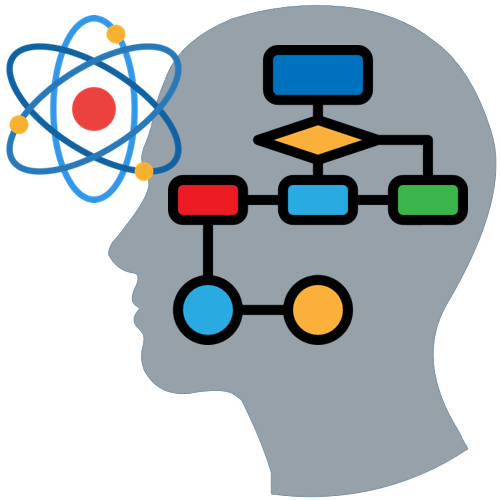
Explore the construction of scientific thinking, or how to think like a scientist. Scientific literacy - the act of thinking and questioning. Researcher's Assumptions. Science paradigms. Common sense (vulgar knowledge) vs Scientific knowledge (scientific method). The life cycle of science. How science is disseminated. Differences between opinion articles, white papers and scientific articles (papers). Where scientific papers are published. Structures to be identified when reading a scientific article. Know the access to academic search engines and scientific databases. Know the steps of conducting research activities focusing on rigor and relevance. The course encourages students to adopt critical reflection in their current and future work practices, or to think critically, in addition to understanding the use of the foundation of concepts, subjects and contents used in the methodology for structuring scientific projects.
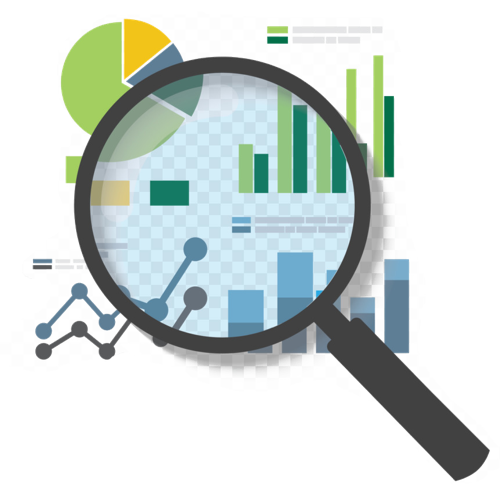
Understand and practice investigative activities using datasets to discover patterns, detect anomalies, test hypotheses and verify assumptions, with the help of graphical representations and basic statistical techniques. Types of variables and distributions. Descriptive measures of position (mean; percentiles) and dispersion (standard deviation; variance). Identification and treatment of outliers and missing values. Visualization of data with graphical representations (barplot, box plot, scatter plot, histogram, etc.) and their appropriate uses. Correlation of variables: conceptual understanding and use of diagrams / correlation matrix. Simple and multiple linear regression. Cluster Analysis. Classes with hands-on dataset and analytical structures bringing examples of practical cases to be applied in business environments. Software used in classes: R and Orange.
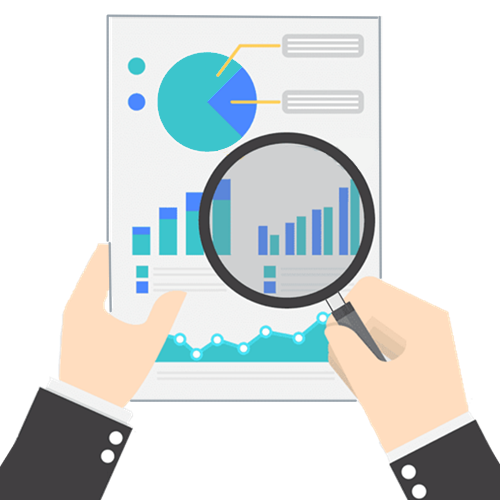
Understand the thematic of Business Analytics, considering its conceptual (theoretical) and applied (practical) aspects, and establishing relationships with its applicability in business. Know the levels of use of data analytics, and their relationship with analytical techniques & approaches to transform data into information / knowledge; identify the ways that Business Analytics can assist in organizational management, in the most varied areas of a business; study alternative frameworks, models and methodologies for managing Business Analytics activities in organizations; reflect on the use of Business Analytics as a strategic tool for business decision-making, and build data visualization structures, graphs and dashboards (data panel), with an approach to concepts and practical examples, aimed at decision making and analysis business strategy. Software used in classes: R, Orange and Tableau Desktop.

Recognize the impacts and changes in business provided by the digital environment. The Big Data Era, its fields of study and its applications. Digital innovation: main theoretical frameworks and the measurement of organizational maturity level. Evaluation and development of new data-driven business models (supported by Analytics, Data Science, Machine Learning and Artificial Intelligence). Business Analytics and Data-Driven Culture. Current & emerging technologies (Internet of Things, Network Games, Blockchain, 5G, 6G, Wearables, Virtual Reality, Augmented Reality, etc.) and their applications in business. Technologies applied to Industry 4.0, logistics systems, retail, services and the financial system. Cyber security and potential risks in the digital business universe (phishing, fake news, data privacy, etc.). Understand the main aspects of the General Data Protection Law (LGPD).
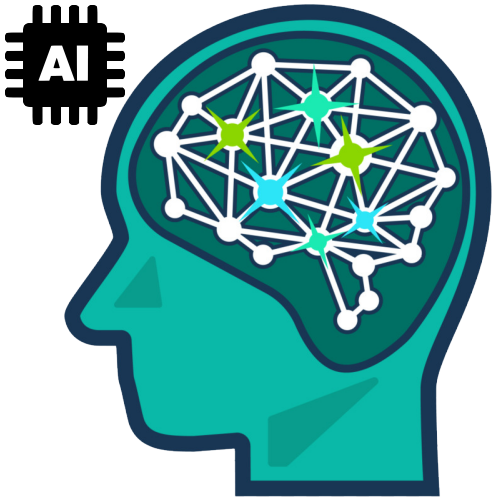
This course seeks to study and understand the thematic of Artificial Intelligence (AI) and its potential uses and applications in Business, from the perspective of the research field of Technology and Innovation Management (TIM), Accounting & Finance. The use of AI as a technology to influence the way we live, communicate, work, learn, interact, etc., whether through applications that we are already familiar with today, for example: credit/risk analysis, health diagnosis, recognition facial or photo/image patterns, legal analyses, or those we still have no idea that will emerge, will be even more influenced by Generative AI, a category of AI algorithms that generate new content based on existing data.
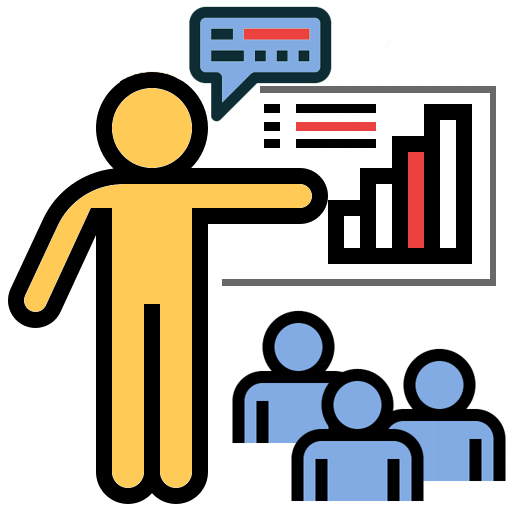
Understand the principles of Data Literacy & Data Storytelling. In current times, due to the immense availability of data in the most varied areas of business, being able to understand and interpret this data are essential skills to generate decision-making based on evidence, instead of common sense or personal judgment. Data Literacy improves communication and collaboration of teams from different areas of the organization, as well as, the ability to tell stories with data (Data Storytelling) helps to communicate insights (findings) with clarity and persuasion, as it contextualizes and makes the transmission of information more accessible, to influence understandings, or convince a certain audience.

With the emergence of new technologies, in a constantly changing market, understanding and studying innovative business models (Business Model Innovation) allows identifying new business opportunities that meet the needs of organizations, keeping them competitive. The discipline presents different business models already consolidated, in use in global companies, and challenges its participants to identify market opportunities and develop a plan to apply such business models, whether through the analysis of market trends, consumer behavior, adapting recipes, costs and the value chain, developing new products and services, etc., to meet the needs of the market and customers.
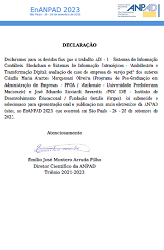
Ambidestria e Transformação Digital: avaliação de caso de empresa do varejo pet
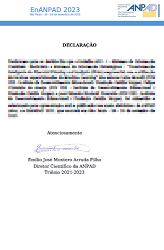
Transformação inteligente do Financial Planning and Analysis (FP&A) empresarial com a utilização de técnicas supervisionadas de Machine Learning
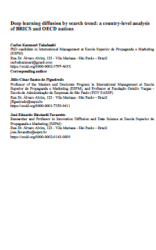
Deep Learning Diffusion by Search Trend: a Country-Level Analysis of BRICS and OECD Nations
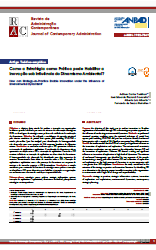
How can strategy-as-practice enable innovation under the influence of environmental dynamism?
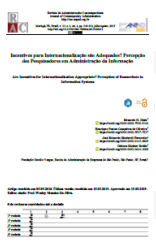
Are Incentives for Internationalization Appropriate? Perception of Researchers in Information Systems
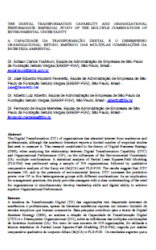
The Digital Transformation Capability and Organizational Performance: empirical study of the multiple combinations of Environmental Uncertainty
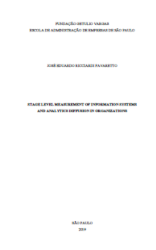
Stage level measurement of Information Systems and Analytics diffusion in Organizations
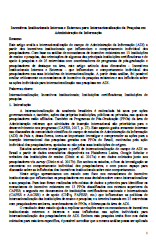
Incentivos Institucionais Internos e Externos para Internacionalização da Pesquisa em Administração da Informação
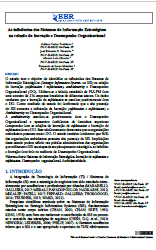
The Influences of Strategic Information Systems on the Relationship between Innovation and Organizational Performance
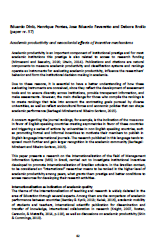
Academic productivity and neocolonial effects of incentive mechanisms
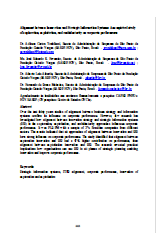
Alignment between Innovation and Strategic Information Systems: An empirical study of exploration, exploitation, and ambidexterity on corporate performance
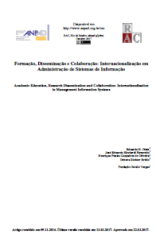
Academic Education, Research Dissemination and Collaboration: Internationalization in Management Information Systems
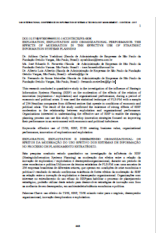
Os efeitos do Strategic Information Systems (SIS) na Inovação de Exploration e Exploitation: Um estudo empírico sobre a incerteza ambiental.
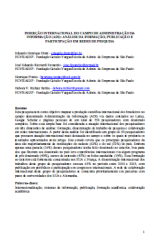
Internacionalização da pesquisa em Administração de Sistemas de Informação (ADI) e apoio institucional: visão dos pesquisadores
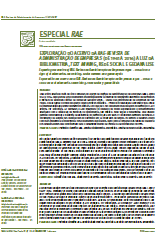
Exploring the archive of RAE-Revista de Administração de Empresas (1961 - 2016) in the light of bibliometrics, text mining, social network and geoanalysis
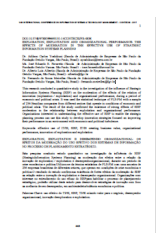
Exploration, Exploitation and Organizational Performance: The effects of moderation in the effective use of Strategic Information Systems Planning
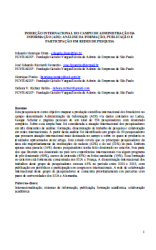
Inserção Internacional do Campo de Administração da Informação (ADI): Análise da Formação, Publicação e Participação em Redes de Pesquisa
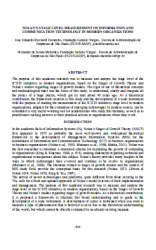
Nolan´s Stage Level Measurement of Information and Communication Technology in Modern Organizations
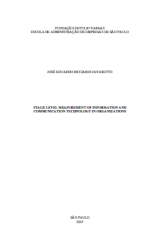
Stage Level Measurement of Information and Communication Technology in Organizations
Bass, F. M. (1969). A new product growth for model consumer durables. Management Science, 15 (5), 215–227. https://doi.org/10.1287/mnsc.15.5.215
Diniz, E. H., Oliveira, H. P. G., Favaretto, J. E. R., Brolio, D. R. (2019). Are Incentives for Internationalization Appropriate? Perception of Researchers in Information Systems. Revista de Administração Contemporânea, 23(4), 520-542. https://doi.org/10.1590/1982-7849rac2019180232
Diniz, E. H., Oliveira, H. P. G., Favaretto, J. E. R., Brolio, D. R. (2018a). Incentivos Institucionais Internos e Externos para Internacionalização da Pesquisa em Administração da Informação In: XLII Encontro da Associação Nacional de Pós-Graduação e Pesquisa em Administração - EnANPAD, outubro, 2018, Curitiba, PR.
Diniz, E. H., Oliveira, H. P. G., Favaretto, J. E. R., Brolio, D. R. (2018b). Academic productivity and neocolonial effects of incentive mechanisms. In: 8th Organizations, Artifacts & Practices (OAP) Workshops, 82-86, June 2018. Amsterdam, Netherlands.
Diniz, E. H., Favaretto, J. E. R., Oliveira, H. P. G., Brolio, D. R. (2017a). Academic Education, Research Dissemination and Collaboration: Internationalization in Management Information Systems. Revista de Administração Contemporânea, 21(6), 811-831. https://doi.org/10.1590/1982-7849rac2017160319
Diniz, E. H., Favaretto, J. E. R., Oliveira, H. P. G., Brolio, D. R. (2017b). Internacionalização da pesquisa em Administração de Sistemas de Informação (ADI) e apoio institucional: visão dos pesquisadores. In: XLI Encontro da Associação Nacional de Pós-Graduação e Pesquisa em Administração - EnANPAD, outubro, 2017. São Paulo, SP.
Diniz, E. H., Favaretto, J. E. R., Oliveira, H. P. G., & Brólio, D. V. R. (2016). Inserção Internacional do Campo de Administração da Informação (ADI): Análise da Formação, Publicação e Participação em Redes de Pesquisa. In: XL Encontro da Associação Nacional de Pós-Graduação e Pesquisa em Administração - EnANPAD, outubro, 2016. Costa do Sauípe, BA.
 Photo: Cycle of the Scientific Publication. Credit: Prof. Dr. Eduardo Diniz, Disciplina de Oficina de Pesquisa (FGV-EAESP), 10/october/2013.
Photo: Cycle of the Scientific Publication. Credit: Prof. Dr. Eduardo Diniz, Disciplina de Oficina de Pesquisa (FGV-EAESP), 10/october/2013.
Favaretto, J. E. R. (2019). Stage level measurement of Information Systems and Analytics diffusion in Organizations. Academic Doctoral Thesis. Fundação Getulio Vargas, Escola de Administração de Empresas de São Paulo (FGV EAESP). Sao Paulo, Brazil. https://doi.org/10.13140/RG.2.2.15082.16328
Favaretto, J. E. R. (2015). Stage Level Measurement of Information and Communication Technology in Organizations. Academic Dissertation. Fundação Getulio Vargas, Escola de Administração de Empresas de São Paulo (FGV EAESP). Sao Paulo, Brazil. https://doi.org/10.13140/RG.2.2.16844.82562
Favaretto, J. E. R., & Francisco, E. R. (2017). Exploring the archive of RAE-Revista de Administração de Empresas (1961 - 2016) in the light of bibliometrics, text mining, social network and geoanalysis. Revista de Administração de Empresas, 57(4), 365-390. https://doi.org/10.1590/S0034-759020170407
Favaretto, J. E. R., & Meirelles, F. S. (2015). Nolan´s stage level measurement of Information and Communication Technology in modern organizations. In: 46th Annual Southwest Decision Sciences Institute (SWDSI) Conference, 410-418. Houston, USA.
Gompertz, B. (1825). On the nature of the function expressive of the law of human mortality, and on a new mode of determining the value of Life Contingencies. Philosophical Transactions of the Royal Society of London, 115, 513–583. https://doi.org/10.1098/rstl.1825.0026
Kuhn, T. S. (1970). The Structure of Scientific Revolutions. Chicago: University of Chicago Press.
Morelli, L., Araujo, F. C., Favaretto, J. E. R. (2023). Transformação inteligente do Financial Planning and Analysis (FP&A) empresarial com a utilização de técnicas supervisionadas de Machine Learning. In: XLVII Encontro da Associação Nacional de Pós-Graduação e Pesquisa em Administração - EnANPAD, 2023 (Artigo aceito para publicação em Congresso).
Nolan, R. L. (1973). Managing the computer resource: A stage hypothesis. Communications of the ACM, 16(7), 399-405. https://doi.org/10.1145/362280.362284
Oliveira, C. M. A. M., Favaretto, J. E. R. (2023). Ambidestria e Transformação Digital: avaliação de caso de empresa do varejo pet. In: XLVII Encontro da Associação Nacional de Pós-Graduação e Pesquisa em Administração - EnANPAD, 2023 (Artigo aceito para publicação em Congresso).
Rogers, E. M. (2003). Diffusion of Innovations. Fifth ed. Free Press, New York NY.
Takahashi, C. K., Figueiredo, J. C. B. de, & Favaretto, J. E. R. (2023). Deep Learning diffusion by search trend: a country-level analysis. Future Studies Research Journal, 15(1), 1–40. https://doi.org/10.24023/FutureJournal/2175-5825/2023.v15i1.695
Takahashi, C. K., Figueiredo, J. C. B. de, & Favaretto, J. E. R. (2022). Deep Learning Diffusion by Search Trend: A Country-Level Analysis of BRICS and OECD Nations. SSRN Electronic Journal (Preprint). https://doi.org/10.2139/ssrn.4140105
Verhulst, P. F. (1838). Notice sur la loi que la population poursuit dans son accroissement. Correspondance Mathématique et Physique, 10, 113–121.
Yoshikuni, A. C., Favaretto, J. E. R., Albertin, A. L., & Meirelles, F. S. (2022). How can Strategy-as-Practice Enable Innovation Under the Influence of Environmental Dynamism?. Revista de Administração Contemporânea, 26(1), e200131. https://doi.org/10.1590/1982-7849rac2022200131.en
Yoshikuni, A. C., Favaretto, J. E. R., Albertin, A. L., & Meirelles, F. S. (2019). The Digital Transformation Capability and Organizational Performance: empirical study of the multiple combinations of Environmental Uncertainty. In: 16th International Conference On Information Systems & Technology Management - CONTECSI. AIS Brazil Chapter Official Conference. Sao Paulo, Brazil.
Yoshikuni, A. C., Favaretto, J. E. R., Albertin, A. L., & Meirelles, F. S. (2018a). The Influences of Strategic Information Systems on the Relationship between Innovation and Organizational Performance. Brazilian Business Review, 15(5), 444-459. https://doi.org/10.15728/bbr.2018.15.5.3
Yoshikuni, A. C., Favaretto, J. E. R., Albertin, A. L., & Meirelles, F. S. (2018b). Alinhamento entre a Inovação e os Sistemas de Informação Estratégicos: Um estudo empírico nas abordagens de exploration, exploitation e ambidestralidade no desempenho corporativo. In: 15th International Conference On Information Systems & Technology Management - CONTECSI. AIS Brazil Chapter Official Conference, 3243-3260. São Paulo, Brasil. https://doi.org/10.5748/9788599693148-15CONTECSI/PS-5826
Yoshikuni, A. C., Favaretto, J. E. R., Albertin, A. L., & Meirelles, F. S. (2017a). Os efeitos do Strategic Information Systems (SIS) na Inovação de Exploration e Exploitation: Um estudo empírico sobre a incerteza ambiental. In: XLI Encontro da Associação Nacional de Pós-Graduação e Pesquisa em Administração - EnANPAD, outubro, 2017, São Paulo, SP. EnANPAD, 2017.
Yoshikuni, A. C., Favaretto, J. E. R., Albertin, A. L., & Meirelles, F. S. (2017b). Exploration, Exploitation and Organizational Performance: The effects of moderation in the effective use of Strategic Information Systems Planning. In: 14th International Conference On Information Systems & Technology Management - CONTECSI. AIS Brazil Chapter Official Conference, 3925-3950. Sao Paulo, Brazil. https://doi.org/10.5748/9788599693131-14CONTECSI/PS-4838